- Home
- Eoin Colfer
Artemis Fowl (Disney) Page 2
Artemis Fowl (Disney) Read online
Page 2
The fairy woman withdrew a closed fist.
“No use to you anyway. Written in the old tongue.”
Artemis nodded, not trusting himself to speak.
She opened her knobbly fingers. Lying in her palm was a tiny golden volume the size of a matchbox.
“Here, human. Thirty of your minutes. No more.”
Butler took the tiny tome reverentially. The bodyguard activated a compact digital camera and began photographing each wafer-thin page of the Book. The process took several minutes. When he was finished, the entire volume was stored on the camera’s chip. Artemis preferred not to take chances with information. Airport security equipment had been known to wipe many a vital disk. So he instructed his aide to transfer the file to his portable phone, and from there e-mail it to Fowl Manor in Dublin. Before the thirty minutes were up, the file containing every symbol in the Fairy Book was sitting safely in the Fowl server.
Artemis returned the tiny volume to its owner.
“Nice doing business with you.”
The sprite lurched to her knees. “The other potion, human?”
Artemis smiled. “Oh yes, the restoring booster. I suppose I did promise.”
“Yes. Human promised.”
“Very well. But before we administer it, I must warn you that purging is not pleasant. You’re not going to enjoy this one bit.”
The fairy gestured around her at the squalid filth. “You think I enjoy this? I want to fly again.”
Butler loaded the second vial, shooting this one straight into the carotid artery.
The sprite immediately collapsed on the mat, her entire frame quivering violently.
“Time to leave,” commented Artemis. “A hundred years of alcohol leaving a body by any means possible is not a pretty sight.”
The Butlers had been serving the Fowls for centuries. It had always been that way. Indeed, there were several eminent linguists of the opinion that this was how the common noun had originated. The first record of this unusual arrangement was when Virgil Butler had been contracted as servant, bodyguard, and cook to Lord Hugo de Fole for one of the first great Norman crusades.
At the age of ten, Butler children were sent to a private training center in Israel, where they were taught the specialized skills necessary to guard the latest in the Fowl line. These skills included Cordon Bleu cooking, marksmanship, a customized blend of martial arts, emergency medicine, and information technology. If, at the end of their training, there was not a Fowl to guard, then the Butlers were eagerly snapped up as bodyguards for various royal personages, generally in Monaco or Saudi Arabia.
Once a Fowl and a Butler were put together, they were paired for life. It was a demanding job, and lonely, but the rewards were handsome if you survived to enjoy them. If not, then your family received a six-figure settlement plus a monthly pension.
The current Butler had been guarding young Master Artemis for twelve years, since the moment of his birth. And, though they adhered to the age-old formalities, they were much more than master and servant. Artemis was the closest thing Butler had to a friend, and Butler was the closest Artemis had to a father, albeit one who obeyed orders.
Butler held his tongue until they were aboard the Heathrow connection from Bangkok, then he had to ask.
“Artemis?”
Artemis looked up from the screen of his PowerBook. He was getting a head start on the translation.
“Yes?”
“The sprite. Why didn’t we simply keep the Book and leave her to die?”
“A corpse is evidence, Butler. My way, the People will have no reason to be suspicious.”
“But the sprite?”
“I hardly think she will confess to showing humans the Book. In any case, I mixed a slight amnesiac into her second injection. When she finally wakes up, the last week will be a blur.”
Butler nodded appreciatively. Always two steps ahead, that was Master Artemis. People said he was a chip off the old block. They were wrong. Master Artemis was a brand-new block, the likes of which had never been seen before.
Doubts assuaged, Butler returned to his copy of Guns & Ammo, leaving his employer to unravel the secrets of the universe.
BY now, you must have guessed just how far Artemis Fowl was prepared to go in order to achieve his goal. But what exactly was this goal? What outlandish scheme would involve the blackmailing of an alcohol-addicted sprite? The answer was gold.
Artemis’s search had begun two years previously when he first became interested in surfing the Internet. He quickly found the more arcane sites: alien abduction, UFO sightings, and the supernatural. But most specifically the existence of the People.
Trawling through gigabytes of data, he found hundreds of references to fairies from nearly every country in the world. Each civilization had its own term for the People, but they were undoubtedly members of the same hidden family. Several stories mentioned a Book carried by each fairy. It was their bible, containing, as it allegedly did, the history of their race and the commandments that governed their extended lives. Of course, this book was written in Gnommish, the fairy language, and would be of no use to any human.
Artemis believed that with today’s technology the Book could be translated. And with this translation you could begin to exploit a whole new group of creatures.
Know thine enemy was Artemis’s motto, so he immersed himself in the lore of the People until he had compiled a huge database on their characteristics. But it wasn’t enough. So Artemis put out a call on the Web: Irish businessman will pay large amount of U.S. dollars to meet a fairy, sprite, leprechaun, pixie.The responses had been mostly fraudulent, but Ho Chi Minh City had finally paid off.
Artemis was perhaps the only person alive who could take full advantage of his recent acquisition. He still retained a childlike belief in magic, tempered by an adult determination to exploit it. If there was anybody capable of relieving the fairies of some of their magical gold, it was Artemis Fowl the Second.
It was early morning before they reached Fowl Manor. Artemis was anxious to bring up the file on his computer, but first he decided to call in on Mother.
Angeline Fowl was bedridden. She had been since her husband’s disappearance. Nervous tension, the physicians said. Nothing for it but rest and sleeping pills. That was almost a year ago.
Butler’s little sister, Juliet, was sitting at the foot of the stairs. Her gaze was boring a hole in the wall. Even the glitter mascara couldn’t soften her expression. Artemis had seen that look already, just before Juliet had suplexed a particularly impudent pizza boy. The suplex, Artemis gathered, was a wrestling move. An unusual obsession for a teenage girl. But then again she was, after all, a Butler.
“Problems, Juliet?”
Juliet straightened hurriedly. “My own fault, Artemis. Apparently I left a gap in the curtains. Mrs. Fowl couldn’t sleep.”
“Hmm,” muttered Artemis, scaling the oak staircase slowly.
He worried about his mother’s condition. She hadn’t seen the light of day in a long time now. Then again, should she miraculously recover, emerging revitalized from her bedchamber, it would signal the end of Artemis’s own extraordinary freedom. It would be back off to school, and no more spearheading criminal enterprises for you, my boy.
He knocked gently on the arched double doors.
“Mother? Are you awake?”
Something smashed against the other side of the door. It sounded expensive.
“Of course I’m awake! How can I sleep in this blinding glare?”
Artemis ventured inside. An antique four-poster bed threw shadowy spires in the darkness, and a pale sliver of light poked through a gap in the velvet curtains. Angeline Fowl sat hunched on the bed, her pale limbs glowing white in the gloom.
“Artemis, darling. Where have you been?”
Artemis sighed. She recognized him. That was a good sign.
“School trip, Mother. Skiing in Austria.”
“Ah, skiing,” crooned Angeline. “How
I miss it. Maybe when your father returns.”
Artemis felt a lump in his throat. Most uncharacteristic.
“Yes. Perhaps when Father returns.”
“Darling, could you close those wretched curtains? The light is intolerable.”
“Of course, Mother.”
Artemis felt his way across the room, wary of the lowlevel clothes chests scattered around the floor. Finally his fingers curled around the velvet drapes. For a moment he was tempted to throw them wide open, then he sighed and closed the gap.
“Thank you, darling. By the way, we really have to get rid of that maid. She is good for absolutely nothing.”
Artemis held his tongue. Juliet had been a hardworking and loyal member of the Fowl household for the past three years. Time to use Mother’s absentmindedness to his advantage.
“You’re right of course, Mother. I’ve been meaning to do it for some time. Butler has a sister I believe would be perfect for the position. I think I’ve mentioned her. Juliet?”
Angeline frowned. “Juliet? Yes, the name does seem familiar. Well, anyone would be better than that silly girl we have now. When can she start?”
“Straight away. I’ll have Butler fetch her from the lodge.”
“You’re a good boy, Artemis. Now, give Mummy a hug.”
Artemis stepped into the shadowy folds of his mother’s robe. She smelled perfumed, like petals in water. But her arms were cold and weak.
“Oh, darling,” she whispered, and the sound sent goose bumps popping down Artemis’s neck. “I hear things. At night. They crawl along the pillows and into my ears.”
Artemis felt that lump in his throat again.
“Perhaps we should open the curtains, Mother.”
“No,” his mother sobbed, releasing him from her grasp. “No. Because then I could see them, too.”
“Mother, please.”
But it was no use. Angeline was gone. She crawled to the far corner of the bed, pulling the quilt under her chin.
“Send the new girl.”
“Yes, Mother.”
“Send her with cucumber slices and water.”
“Yes, Mother.”
Angeline glared at him with crafty eyes. “And stop calling me Mother. I don’t know who you are, but you’re certainly not my little Arty.”
Artemis blinked back a few rebellious tears. “Of course. Sorry, Moth—Sorry.”
“Hmmm. Don’t come back here again, or I’ll have my husband take care of you. He’s a very important man, you know.”
“Very well, Mrs. Fowl. This is the last you’ll see of me.”
“It had better be.” Angeline froze suddenly. “Do you hear them?”
Artemis shook his head. “No. I don’t hear any—”
“They’re coming for me. They’re everywhere.”
Angeline dived for cover beneath the bedclothes. Artemis could still hear her terrified sobs as he descended the marble staircase.
The Book was proving far more stubborn than Artemis had anticipated. It seemed to be almost actively resisting him. No matter which program he ran it through, the computer came up blank.
Artemis hard-copied every page, tacking them to the walls of his study. Sometimes it helped to have things on paper. The script was like nothing he’d seen before, and yet it was strangely familiar. Obviously a mixture of symbolic and character-based language, the text meandered around the page in no apparent order.
What the program needed was some frame of reference, some central point on which to build. He separated all the characters and ran comparisons with English, Chinese, Greek, Arabic, and with Cyrillic texts, even with Ogham. Nothing.
Moody with frustration, Artemis sent Juliet scurrying when she interrupted with sandwiches, and moved on to symbols. The most frequently recurring pictogram was a small male figure. Male, he presumed, though with the limited knowledge of the fairy anatomy he supposed it could be female. A thought struck him. Artemis opened the ancient languages file on his Power Translator and selected Egyptian.
At last. A hit. The male symbol was remarkably similar to the Anubis god representation on Tutankhamen’s inner-chamber hieroglyphics. This was consistent with his other findings. The first written human stories were about fairies, suggesting that their civilization predated man’s own. It would seem that the Egyptians had simply adapted an existing scripture to suit their needs.
There were other resemblances. But the characters were just dissimilar enough to slip through the computer’s net. This would have to be done manually. Each Gnommish figure had to be enlarged, printed, and then compared with the hieroglyphs.
Artemis felt the excitement of success thumping inside his rib cage. Almost every fairy pictogram or letter had an Egyptian counterpart. Most were universal, such as the sun or birds. But some seemed exclusively supernatural and had to be tailored to fit. The Anubis figure, for example, would make no sense as a dog god, so Artemis altered it to read king of the fairies.
By midnight, Artemis had successfully fed his findings into the Macintosh. All he had to do now was press Decode. He did so. What emerged was a long, intricate string of meaningless gibberish.
A normal child would have abandoned the task long since. The average adult would probably have been reduced to slapping the keyboard. But not Artemis. This book was testing him, and he would not allow it to win.
The letters were right, he was certain of it. It was just the order that was wrong. Rubbing the sleep from his eyes, Artemis glared at the pages again. Each segment was bordered by a solid line. This could represent paragraphs or chapters, but they were not meant to be read in the usual left to right, top to bottom fashion.
Artemis experimented. He tried the Arabic right to left and the Chinese columns. Nothing worked. Then he noticed that each page had one thing in common—a central section. The other pictograms were arranged around this pivotal area. So, a central starting point, perhaps. But where to go from there? Artemis scanned the pages for some other common factor. After several minutes he found it. There was on each page a tiny spearhead in the corner of one section. Could this be an arrow? A direction? Go this way? So the theory would be, start in the middle then follow the arrow. Reading in spirals.
The computer program wasn’t built to handle something like this, so Artemis had to improvise. With a craft knife and ruler, he dissected the first page of the Book and reassembled it in the traditional Western languages order—left to right, parallel rows. Then he rescanned the page and fed it through the modified Egyptian translator.
The computer hummed and whirred, converting all the information to binary. Several times it stopped to ask for confirmation of a character or symbol. This happened less and less as the machine learned the new language. Eventually two words flashed on the screen: File converted.
Fingers shaking from exhaustion and excitement, Artemis clicked Print. A single page scrolled from the LaserWriter. It was in English now. Yes, there were mistakes, some fine-tuning needed, but it was perfectly legible, and, more important, perfectly understandable.
Fully aware that he was probably the first human in several thousand years to decode the magical words, Artemis switched on his desk light and began to read.
THE BOOKE OF THE PEOPLE.
BEING INSTRUCTIONS TO OUR MAGICKS
AND LIFE RULES.
Carry me always, carry me well.
I am thy teacher of herb and spell.
I am thy link to power arcane.
Forget me and thy magick shall wane.
Ten times ten commandments there be.
They will answer every mystery.
Cures, curses, alchemy.
These secrets shall be thine, through me.
But, Fairy, remember this above all.
I am not for those in mud that crawl.
And forever doomed shall be the one,
Who betrays my secrets one by one.
Artemis could hear the blood pumping in his ears. He had them. They would be as ants beneath his
feet. Their every secret would be laid bare by technology. Suddenly the exhaustion claimed him and he sank back in his chair. There was so much yet to complete. Forty-three pages to be translated for a start.
He pressed the intercom button that linked him to speakers all over the house. “Butler. Get Juliet and come up here. There are some jigsaws I need you to assemble.”
Perhaps a little family history would be useful at this point.
The Fowls were, indeed, legendary criminals. For generations they had skirmished on the wrong side of the law, hoarding enough funds to become legitimate. Of course, once they were legitimate they found it not to their liking, and returned almost immediately to crime.
It was Artemis the First, our subject’s father, who had thrown the family fortune into jeopardy. With the breakup of communist Russia, Artemis Senior had decided to invest a huge chunk of the Fowl fortune in establishing new shipping lines to the vast continent. New consumers, he reasoned, would need new consumer goods. The Russian Mafia did not take too kindly to a Westerner muscling in on their market, and so decided to send a little message. This message took the form of a stolen missile launched at the Fowl Star on her way past Murmansk. Artemis Senior was on board the ship, along with Butler’s uncle and 250,000 cans of cola. It was quite an explosion.
The Fowls were not left destitute, far from it. But billionaire status was no longer theirs. Artemis the Second vowed to remedy this. He would restore the family fortune. And he would do it in his own unique fashion.
Once the Book was translated, Artemis could begin planning in earnest. He already knew what the ultimate goal was; now he could figure out how to achieve it.
Gold, of course, was the objective. The acquisition of gold. It seemed that the People were almost as fond of the precious metal as humans. Each fairy had its own cache, but not for much longer if Artemis had his way. There would be at least one of the fairy folk wandering around with empty pockets by the time he’d finished.

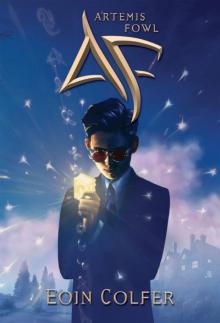 Artemis Fowl
Artemis Fowl Plugged
Plugged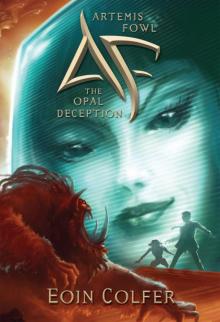 The Opal Deception
The Opal Deception The Arctic Incident
The Arctic Incident The Wish List
The Wish List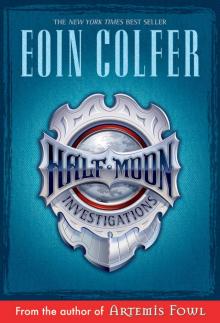 Novel - Half Moon Investigations
Novel - Half Moon Investigations The Supernaturalist
The Supernaturalist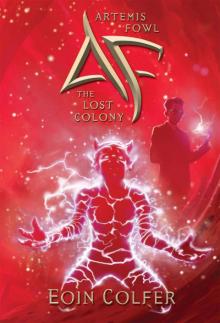 The Lost Colony
The Lost Colony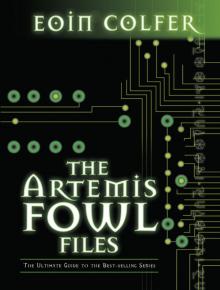 The Artemis Fowl Files
The Artemis Fowl Files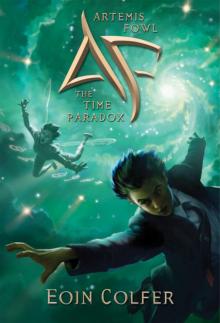 The Time Paradox
The Time Paradox The Atlantis Complex
The Atlantis Complex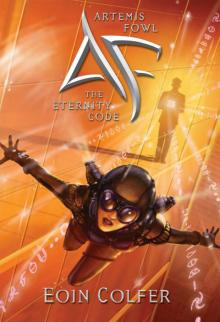 The Eternity Code
The Eternity Code The Time Paradox (Disney)
The Time Paradox (Disney) The Reluctant Assassin
The Reluctant Assassin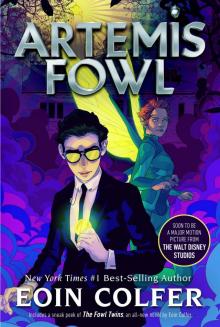 Artemis Fowl (Disney)
Artemis Fowl (Disney) Highfire
Highfire The Last Guardian
The Last Guardian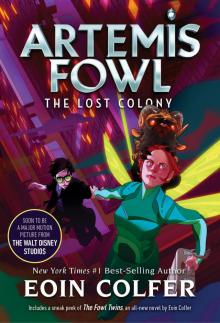 The Lost Colony (Disney)
The Lost Colony (Disney) Screwed: A Novel
Screwed: A Novel Novel - Airman
Novel - Airman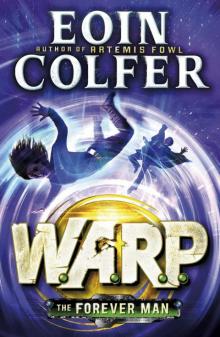 The Forever Man
The Forever Man And Another Thing...
And Another Thing...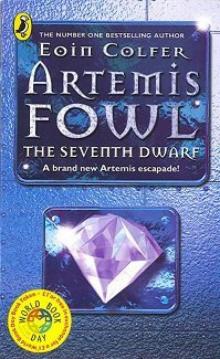 The Seventh Dwarf
The Seventh Dwarf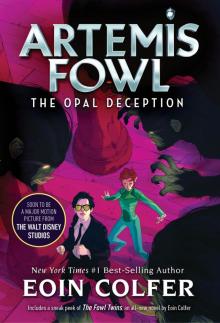 The Opal Deception (Disney)
The Opal Deception (Disney)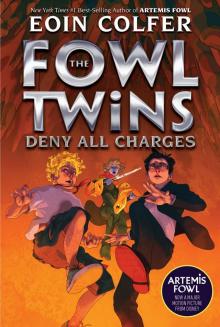 The Fowl Twins Deny All Charges
The Fowl Twins Deny All Charges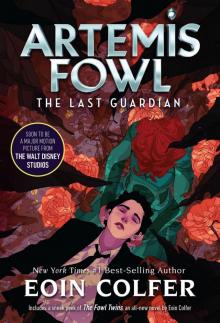 The Last Guardian (Disney)
The Last Guardian (Disney) The Hangman's Revolution
The Hangman's Revolution The Atlantis Complex (Disney)
The Atlantis Complex (Disney) The Eternity Code (Disney)
The Eternity Code (Disney)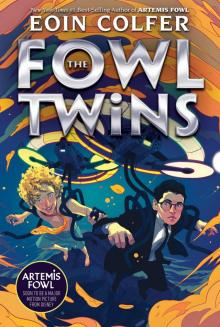 The Fowl Twins
The Fowl Twins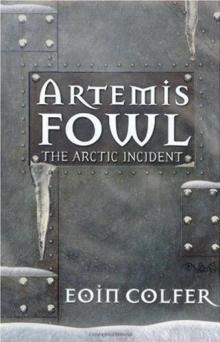 Artemis Fowl. The Arctic Incident af-2
Artemis Fowl. The Arctic Incident af-2 Artemis Fowl and the Atlantis Complex af-7
Artemis Fowl and the Atlantis Complex af-7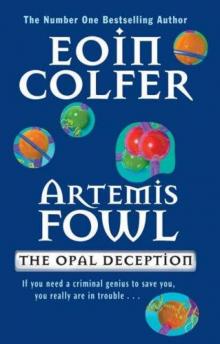 Artemis Fowl. The Opal Deception af-4
Artemis Fowl. The Opal Deception af-4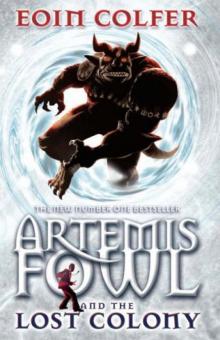 Artemis Fowl. The Lost Colony af-5
Artemis Fowl. The Lost Colony af-5 Airman
Airman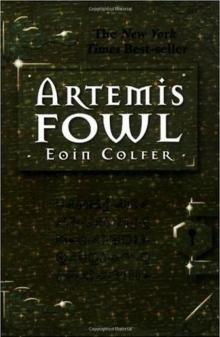 Artemis Fowl af-1
Artemis Fowl af-1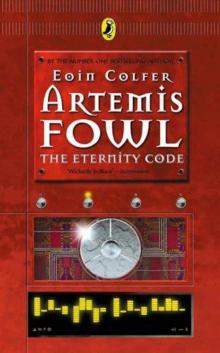 Artemis Fowl: The Eternity Code af-3
Artemis Fowl: The Eternity Code af-3 Screwed dm-2
Screwed dm-2